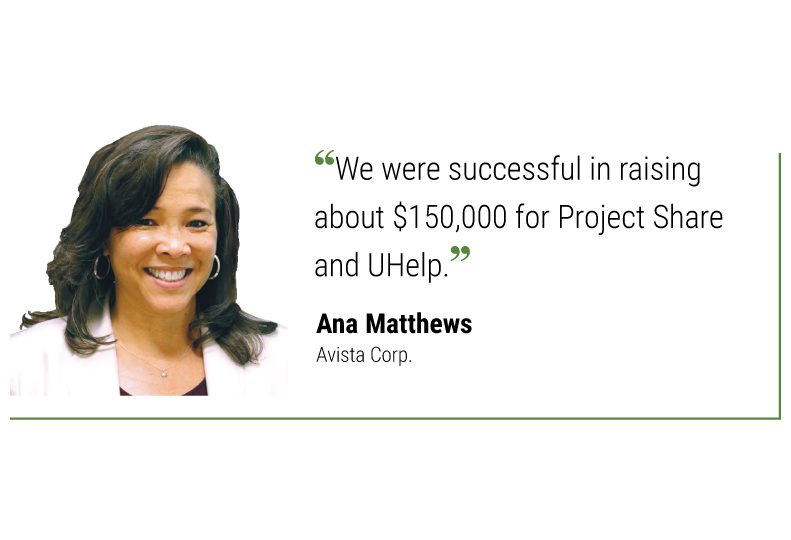
Home » SNAP, utilities partner to keep lights on
SNAP, utilities partner to keep lights on
Requests for payment assistance surge in midst of COVID-19 pandemic

May 21, 2020
Requests for assistance paying utility bills have essentially doubled in Spokane, according to Carol Weltz, director of community action at community service nonprofit Spokane Neighborhood Action Partners.
The organization fielded more than 1,200 requests for assistance last month, up from 620 requests in April 2019.
“We’re serving lots of people who aren’t used to asking for help or needing help,” Weltz says.
Weltz expects request volumes will remain high for a while, she says.
“I’d imagine that we’ll see an increase for the next six months, at least,” Weltz says. “People can juggle for a little while … but the longer this goes on, the more people are running out of resources. Even once they get back to work, it’ll take quite a while for people to get back on their feet.”
Weltz says seasonal staff is typically laid off this time of year—higher energy usage in the winter month spurs greater demand for assistance, typically—but SNAP has asked its 13 seasonal staff to rejoin its 10 year-round employees to address the influx of assistance requests.
As SNAP tries to keep up with assistance requests, Spokane-based energy companies Avista Corp. and Inland Power & Light Co. have been working to create and publicize payment options and help for customers whose ability to pay has been affected by the pandemic.
At Avista, consumer affairs program manager Ana Matthews says about 25% of all incoming calls are from customers seeking assistance in paying their bill. Some of those customers are referred to SNAP, while others find help through Avista.
Inland Power is ramping up efforts to raise funds for its Inland Power Community Foundation, which was established late last year, says Andy Barth, Inland’s business development and community relations officer.
“Before the foundation, we had a program called Operation Round Up, where members could round up their utility bill to the nearest dollar, and those extra cents would be put into this fund for community grants and individual grants from around our service territory,” Barth says.
Through the community foundation, members can continue to have their bills rounded up, as well as opt for regular monthly donations or a one-time donation. Individual members and member organizations can apply for funding, and applications are reviewed at the foundation’s quarterly board meetings.
Most requests for assistance, however, are funneled to SNAP, Barth says, because the nonprofit’s resources are greater than that of the utility company’s community foundation.
The city of Spokane also is involved in efforts to provide utility assistance through a municipal program called UHelp and an Avista program called Project Share.
Through Project Share, community members and organizations can donate money that will go toward paying the utility bills of Avista customers in need.
UHelp is a city program through which donated funds are used to provide one-time assistance to residents who need help paying their city water, sewer, and garbage bills.
Funds from both programs are distributed through SNAP.
At the end of March, the city of Spokane announced that it had partnered with Avista to match donations. For every dollar donated to Project Share and UHelp, the city and Avista each donated a dollar.
“We were successful in raising about $150,000 for Project Share and UHelp,” Matthews says.
Whereas funding from sources such as federal grants takes time to disperse and comes with conditions, Weltz says the funding SNAP receives from Project Share and UHelp quickly goes to people in need.
“It’s money that we don’t have to follow a bunch of guidelines for,” Weltz says. “That is really easy and quick for us to get out, because it doesn’t come with a lot of strings attached.”
Through SNAP, a utility customer struggling to make payments has a few different options, depending on the situation. Those who are at or below 125% of the federal poverty level can receive an annual grant of $100 to $1,000, depending on their energy usage.
SNAP’s emergency assistance program doesn’t have income limits and can be combined with the income-based program. The program offers a one-time payment of up to $350 on utility bills.
“It’s for people who get a past-due notice or shutoff notice,” Weltz says. “Maybe their car broke down and they had to use their money for that -- when you live on a limited income, little stuff like that can throw you off.”
SNAP and Avista also partner to help seniors and disabled customers. For electricity alone, eligible senior or disabled customers can receive a grant of $100. Those who have electricity and heating bills through Avista can receive a grant of up to $400.
In addition to its regular assistance programs, SNAP has received authorization from Avista and from the federal government to provide additional emergency relief funds to those affected by COVID-19.
Regardless of where the money comes from, providing utility payment help to people who need it, especially in a turbulent economic period, is paramount, Weltz says.
“If we can keep people stabilized in their home to where they’re not stressed out about how they’re going to get by, people can at least feel a little more OK,” Weltz says. “When people are stabilized in their homes, it creates a lot less stress for the household and for families. That’s key in getting things back to normal.”
Latest News Up Close
Related Articles
Related Products

![Brad head shot[1] web](https://www.spokanejournal.com/ext/resources/2025/03/10/thumb/Brad-Head-Shot[1]_web.jpg?1741642753)

